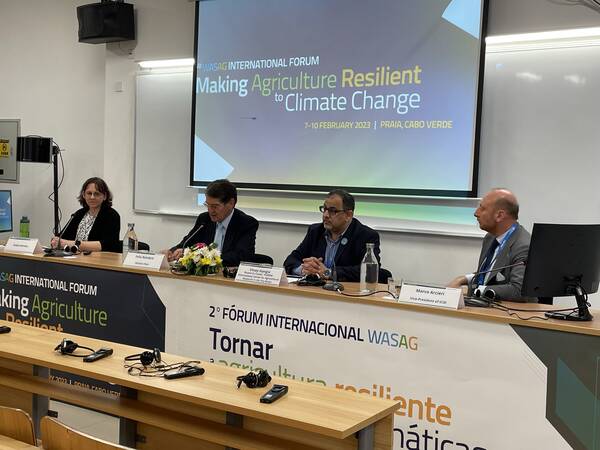ICARDA joins FAO's WASAG Forum to drive climate-smart agriculture solutions

Praia, Cabo Verde, West Africa, 7-10 February 2023 – ICARDA’s Soil, Water and Agronomy (SWA) Team in partnership with the Food and Agriculture Organization (FAO) held a dryland agriculture session in the 2nd Global Framework on Water Scarcity and Agriculture (WASAG) Forum hosted by FAO.
WASAG was established in 2016 under FAO’s auspices. Its main objective is to support countries and stakeholders in their commitments and plans related to the 2030 Sustainable Development Agenda and finding solutions for coping with climate change's impact on agriculture. WASAG plays a significant role in developing collaborative actions as solutions to the increasing challenges posed by climate change and the resulting water scarcity to make agriculture more resilient. The Forum brings together concerned partners to exchange relevant, latest practices, knowledge, and experience on critical issues and provides an opportunity for collaboration among partners. WASAG partners aim to nudge policymakers to address water scarcity in agriculture.
With over 2,000 participants joining online and some 300 in person, the Forum served to spotlight the interlinkages between climate change and agriculture water scarcity and the need to combine efforts to tackle risks facing agriculture.
Attended by Prime Minister of Cabo Verde H.E. José Ulisses de Pina Correia e Silva; Minister of Agriculture and Environment of Cabo Verde H.E. Gilberto Silva; Director of Land and Water Division at FAO, Dr. Lifeng Li, and other high-level delegates, the Forum showcased the great role of WASAG in achieving synergies and impacts and finding effective solutions for sustainable, climate-resilient agriculture.

The session on dryland agriculture showcased the latest advances in the area of water management that held considerable promise in enhancing the resilience of agriculture to the impacts of climatic variability and change. Dryland agriculture encompassed a range of production systems that relied on marginal rainfed land and rangelands. In view of the changing and unpredictable climate conditions, the attention paid to drylands needed to be sustained and focused.
Various strategies could be applied to improve dryland agriculture, including but not limited to supplemental irrigation, rainwater harvesting, diversified intercropping systems, maximizing economic water productivity, solar irrigation using desalinated water, agroforestry, and integrated crop-livestock-forage systems. Implementing such approaches could help address the challenges faced by dryland farmers and promote sustainable agricultural practices better adapted to the changing climate.
The session brought together examples of promising solutions in fields of accurate estimation of crop water requirements using modern techniques, the water-energy-food nexus, ultra-low energy drip irrigation, digital applications for informed decision-making, and those leading to improvements in physical and economic water productivity. We had colleagues and collaborators from the ICID, MIT, Tottori University, and national research institutions from Burkina Faso, Italy, and Tunisia join.
A Praia Call for Action to collaboratively tackle water scarcity in agriculture was released at the end of the Forum - The Praia Call for Action | WASAG – The Global Framework on Water Scarcity in Agriculture | Food and Agriculture Organization of the United Nations (fao.org)
ICARDA is a founding Steering Committee Member of WASAG, and ICARDA’s SWA Research Team Leader Vinay Nangia served on the Forum’s Organizing Committee.
